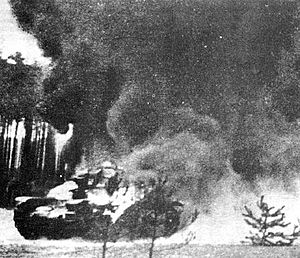Battle of the Metaxas Line facts for kids
Quick facts for kids Battle of the Metaxas Line |
|||||||
|---|---|---|---|---|---|---|---|
| Part of the Battle of Greece | |||||||
 German tank set on fire by Greek Artillery, April 1941. |
|||||||
|
|||||||
| Belligerents | |||||||
| Commanders and leaders | |||||||
| Strength | |||||||
2 Armored divisions 5 infantry divisions 2 independent enhanced infantry regiments 650 aircraft |
5 divisions 188 field artillery pieces 76 anti-tank guns 30 anti-aircraft guns 40 tankettes |
||||||
| Casualties and losses | |||||||
| 1400+ killed 192+ missing 2,403+ wounded Total 3.995+ |
unknown | ||||||
The Battle of the Metaxas Line was the first major fight during the German invasion of Greece in World War II. It happened between April 6 and 9, 1941, along the Greek-Bulgarian border. The Germans tried to break through a strong line of Greek forts. While they captured some forts, they couldn't fully break the main defense line. However, a German tank division went around the line, crossed into Yugoslavia, and captured Thessaloniki. This forced the Greek army defending the Metaxas Line to surrender.
German General Wilhelm List was very impressed by the bravery of the Greek soldiers. He allowed them to leave with their flags, as long as they gave up their weapons. He even ordered his own soldiers to salute them. At the time, many Greek soldiers were fighting Italy on another front, so the Metaxas Line wasn't fully manned.
Contents
Why the Battle Started
The Italian Invasion of Greece
The battle began because Italy had invaded Greece in October 1940. Italy struggled to win this war, so Germany decided to help. Germany planned an operation called Operation Marita to invade Greece.
Germany's Plan for Invasion
For their invasion, Germany wanted to move troops through Greece's northern neighbors, Bulgaria and Yugoslavia. Bulgaria agreed to let German troops pass, but their own soldiers would not fight. Yugoslavia also agreed at first. However, a coup (a sudden takeover of the government) happened in Yugoslavia. Even though the new government didn't officially cancel the agreement, Adolf Hitler decided to attack Yugoslavia as well as Greece.
The Metaxas Line Defenses
The Metaxas Line was a series of strong forts built by Greece. It was designed to protect Greece from attacks from Bulgaria. Bulgaria had not joined a peace agreement called the Balkan Pact in 1934. This pact aimed to keep things peaceful after World War I.
The Metaxas Line forts were built along the Greek-Bulgarian border, especially where invaders might try to cross. Each fort had its own soldiers. Greece built these forts with limited money, but they used the natural landscape to make them very strong. Construction started in 1936, but the line was still not finished by 1941.
Who Fought in the Battle
German Forces
The German army sent to invade Greece was called the 12th Army. It was led by Field-Marshal Wilhelm List. This army had many divisions, including tank divisions and mountain divisions. Two main groups, the XVIII and XXX Corps, were sent to attack the Metaxas Line.
These German forces included:
- The 2nd Panzer Division, which had tanks.
- Mountain divisions, like the 5th and 6th Mountain Divisions, which were good at fighting in tough, hilly areas.
- Several infantry divisions, made up of foot soldiers.
Greek and Yugoslav Forces
The Greek soldiers defending the Metaxas Line were part of the Eastern Macedonia Army Section. They were led by Lieutenant General Konstantinos Bakopoulos. Another group, the independent Evros Brigade, also helped.
The Greek forces included:
- Several infantry divisions, like the 18th and 14th Infantry Divisions. These divisions defended the forts.
- The 19th Mechanized Division, which had some small tanks called tankettes and motorized units.
A Yugoslav army division, the 20th "Bregalnička" Infantry Division, also helped. They faced the German 2nd Panzer Division, which tried to go around the Greek defenses by crossing through Yugoslavia.
 | Victor J. Glover |
 | Yvonne Cagle |
 | Jeanette Epps |
 | Bernard A. Harris Jr. |

